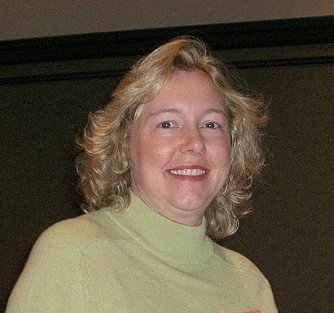Dr. Gretchen Webber
Professor

Departments / Programs
Degree Information
- PHD, University of Texas at Austin (2005)
- MED, University of Texas at Austin (1998)
- MBA, University of Oklahoma (1989)
- BS, University of Oklahoma (1986)
Areas of Expertise
- Family
- Gender
- Intersection of Gender and Work
- Qualitative Methods
Publications
Refereed Journal Articles
- Gretchen Webber and Patti Giuffre. 2019. “Women’s Relationships with Women at Work: Barriers to Solidarity.” Sociology Compass. Online first:1-13. (DOI) 10.1111/soc4.12698.
- Patti Giuffre and Gretchen Webber. 2019. “Teaching and Learning Guide for ‘Women’s Relationships with Women at Work: Barriers to Solidarity.’” Sociology Compa...
Refereed Journal Articles
- Gretchen Webber and Patti Giuffre. 2019. “Women’s Relationships with Women at Work: Barriers to Solidarity.” Sociology Compass. Online first:1-13. (DOI) 10.1111/soc4.12698.
- Patti Giuffre and Gretchen Webber. 2019. “Teaching and Learning Guide for ‘Women’s Relationships with Women at Work: Barriers to Solidarity.’” Sociology Compass. Online first:1-8. (DOI) 10.1111/soc4.12702.
- Michelle L. Estes & Gretchen R. Webber. 2017. “More Closeted Than Gayness Itself”: The Depiction of Same-Sex Couple Violence in Newspaper Media. Journal of Interpersonal Violence. First published date: October-20-2017. 10.1177/0886260517736271.
- Gretchen R. Webber with J. Reid and S. Elliott. 2015 "It's Like Being In Church And Being On A Field Trip": The Date Versus Party Setting In College Students Accounts Of Hooking Up. Symbolic Interaction. Vol 38:175 - 194.
- Brian P. Hinote and Gretchen R. Webber. 2012. Drinking Toward Manhood: Masculinity and Alcohol In The Former USSR. Men and Masculinities 15:292-310.
- Julie Reid*, Sinikka Elliott*, and Gretchen R. Webber*. 2011. Casual Hookups to Formal Dates: Refining the Boundaries of the Sexual Double Standard. Gender & Society 25:545-568.
*Equal authorship. - Gretchen R. Webber and Stephanie Byrd. 2010. In-Depth Interviews. Sloan Work-Family Research Network.(n.d.) http://wfnetwork.bc.edu/encyclopedia_entry.php?id=16783&area=All
- Gretchen R. Webber and Christine L. Williams. 2008. Mothers in "Good" and "Bad" Part-Time Jobs: Different Problems, Same Results. Gender & Society 22:752-777.
- Article selected as 2010 finalist for Rosabeth Moss Kanter Award for Excellence in Work-Family Research competition, given annually by Center for Families at Purdue University and Boston College Center for Work and Family.
- Reprinted in Inequality in Canada: A Reader on the Intersections of Gender, Race, and Class, ed. by Valerie Zawilski. (Oxford 2009).
- Gretchen R. Webber and Christine L. Williams. 2008. Part-Time Work and the Gender Division of Labor. Qualitative Sociology 31:15-36.
Other Publications
- Gretchen R. Webber. (2013) "Good Jobs, Bad Jobs." Sage Sociology of Work Encyclopedia entry.
- Gretchen R. Webber and Lisa L. Walker (2013) "Stay at-home Mothers." Sage Sociology of Work Encyclopedia entry.
- Gretchen. R. Webber. 2009. Book Review, Opting Out? Why Women Really Quit Careers and Head Home, By Pamela Stone. Gender & Society 23:125-127.
- Peter Heller and Gretchen R. Webber. 2008. Initial Outcomes Assessment: Tennessee's Multiple Response System Approach to Child Protective Services. Report to Department of Children's Services.
Research / Scholarly Activity
Dr. Webber recently served as Research Associate on MTSU’s National Science Foundation ADVANCE grant examining STEM faculty experiences. She is also on the editorial board of Sociological Spectrum. Her current research projects examine competing stereotypes about women’s working relationships with other women. She is also conducting a new study involving a content analysis of multiple “success at work” advice books marketed towards women. Both studies raise compelling questions about gender inequality at work and generate recommendations for improving equity.


